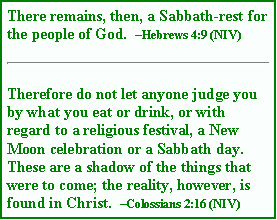
|
All
scripture references are linked to The Bible Gateway. When
you click on a scripture reference, it may take a few moments for it to
load. Once you are finished reading the scripture reference, click "back"
on your browser to return to this article.
|
Christians ought to observe all of the ten commandments,
right? The fourth of the ten commandments, found in Exodus
20:8, is "Remember
the Sabbath day by keeping it holy." What
about that particular commandment? Does this command from the Old Testament
still apply to those of us living under the New Testament? Are we still
supposed to remember the Sabbath day? The answer may surprise you.
What is the Sabbath day? The Sabbath
day was the seventh day of the week–the day we commonly refer to as Saturday.
Why was the seventh day the Sabbath day? The answer is found in the beginning:
| 2By the seventh day
God had finished the work he had been doing; so on the seventh day he rested
from all his work. 3And God blessed the seventh day and made
it holy, because on it he rested from all the work of creating that he
had done. –Genesis
2:2-3 (NIV) |
God set aside the seventh day of the week for rest,
and He made it holy. Throughout the remainder of the Old Testament, there
are countless references to this and other special Sabbaths. The seventh
day of the week, or the Sabbath day, was also the day when the Israelites
or Jews worshiped God.
Why don't Christians worship on the Sabbath
day? Most Christians worship on the first day of the week–the day
we commonly refer to as Sunday. This is not because of some mix-up in the
calendar or because the Sabbath was somehow "moved" to another day. Christians
worship on the first day of the week, because that is the pattern established
by the apostles in the Bible. Just as there is great significance associated
with the seventh day of the week in the Old Testament, there is also great
significance associated with the first day of the week in the New Testament.
Jesus arose from the dead on the first day of the week
(Matthew
28:1; Mark
16:2, 9; Luke
24:1; John
20:1). On that same first day of the week, Jesus
breathed the Holy Spirit upon His disciples (John
20:19-23). On the day of Pentecost, which was 50
days following the Sabbath day and therefore was a first day of the week,
the believers were filled with the Holy Spirit
(Acts
2:1-4; Leviticus
23:9-16). The first Christians observed the Lord's
Supper on the first day of the week
(Acts
20:7). The apostle Paul designated the first day
of the week, when the Christians were already meeting together, as the
appropriate day to collect money for those in need (1
Corinthians 16:1-3). John the apostle received his
revelation on a Lord's Day, the first day of the week (Revelation
1:10). Therefore, Christians are following the biblical
pattern established by the apostles and first Christians by gathering and
worshiping on the first day of the week.
What happened to the Sabbath, then?
Was the Sabbath eliminated by the New Testament? No, while Jesus said that
the Sabbath was made for man, not man for the Sabbath (Mark
2:27), and that He is Lord of the Sabbath (Matthew
12:8; Mark
2:28; Luke
6:5), He also said that He had not come to abolish
the Law but to fulfill it
(Matthew
5:17), and that not the smallest letter or the least
stroke of a pen would disappear from the Law until everything is accomplished
(Matthew
5:18; Luke
16:17). So what happened to the Sabbath, then? Jesus
didn't come to abolish the Law and the Sabbath but to fulfill it.
And
He did fulfill it. He said that not the smallest portion of the
Law would disappear until everything was accomplished. And it was
accomplished. Jesus came to rescue us from a hopeless situation.
He died for our sins, was buried, and arose after three days and three
nights so that we, too, can have eternal life. He fulfilled the Law. He
accomplished what no one else could. As He said on the cross, "It
is finished," (John
19:30). Indeed, it was finished!

What does this mean for Christians? The
law was only a shadow of what was to come. The reality is found in Christ
(Colossians
2:16-17). The old law, with its sacrifices and offerings,
was only temporary or a shadow; the sacrifices had to be repeated and still
weren't adequate because they couldn't take sins away. But Jesus satisfied
the debt for our sins once for all (Hebrews
10:1-16). Because the old law was inadequate for
salvation, God planned all along for a new law or covenant. Christ was
the fulfillment of that plan. Christ did not eliminate the old law, He
made it obsolete
(Hebrews
8:1-13). We now have our rest, or Sabbath, in Jesus
Christ
(Hebrews
4:1-11). It is for this reason that we are not to
let anyone judge us when we do not observe the Sabbath
day (Colossians
2:16-17). Indeed, we do observe and honor the Sabbath,
but our Sabbath is not a day. Our Sabbath is Jesus Christ!
Copyright © 2001 Kimberly B. Southall.
All rights reserved.
|


